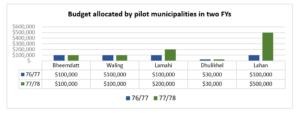Project Partner: Municipal Association of Nepal (MuAN), United Cities of Local Governance Asia Pacific (UCLG ASPAC)
Project Area: Lahan Municipality- Siraha District, Province 2; Dhulikhel Municipality- Kavre District, Bagmati Province; Waling Municipality- Syangja District, Gandaki Province; Lamahi Municipality- Dang District, Lumbini Province; Lahan Municipality- Siraha District, Sudurpaschhim Province
Project Duration: May 2018 – December 2020
Objectives:
• To strengthen capacity of MuAN in implementing national policy and strategy on sanitation, with a focus on Fecal Sludge Management (FSM) and Non-Sewered Sanitation (NSS) system in line with SDG 6.2.
• To contribute in improving the urban sanitation policy framework and guideline through collaboration with relevant ministries and stakeholders.
• To implement the sanitation and investment plans in pilot municipalities focusing on FSM policies, institutional, financial and regulatory framework.
• To develop and improve the accessibility on financial options through different funding mechanisms such as Public-Private Partnerships, cooperation with banks and development.
Project Description:
The “Municipalities Network Advocacy in Sanitation in South Asia (MuNASS)” project, focuses on Fecal Sludge Management policy advocacy at municipal level. The project emphasizes on strengthening capacity of local municipal association and municipalities in designing and implementing robust and developing effective policies on creating sustainable financing strategies on sanitation, particularly on FSM and NSS and improving sanitation policy framework in joint collaboration with associated sanitation level stakeholders. Furthermore, this project, among others, focuses on capacity building, implementing national policy and strategy on sanitation with focus on FSM and NSS system in line with SDG 6.2.
Project Outputs:
-Developed DPR of 5 pilot municipalities.
-Sensitized more than 500 Mayors, Deputy Mayors and elected officials on FSM and Institutional Regulatory Framework through Provincial level workshop in all 7 provinces.
-Capacitated 138 municipal representatives and technical human resources from 5 pilot municipalities on FSM.
-Enhanced capacity and commitments of Champion Mayors on municipal urban sanitation through exposure visits.
-Strengthened cooperation with Ministries and relevant stakeholders.
-Recognized MuAN as a member of NSHCC and a member of Urban Sanitation Promotion Committee (as a subcommittee).
-Published Sanitation Situation Report of 5 Pilot Municipalities.
-Regulated Fecal Sludge Management in 5 model cities/municipalities.
-More than 100 Mayors and Deputy Mayors were sensitized on proper septic tank.
-Developed and disseminated PSA on FSM at mass media utilizing expertise of renowned artist MAHA Jodi and former Miss Nepal.
Major Achievements:
Advocacy and Sensitization
-5 sub-national FSM policies for 5 pilot municipalities developed.
-The municipalities started understanding fecal sludge management as an integrated approach necessary to form a “more civilized” society in present scenario.
Increased Financial Commitment
All five pilot municipalities have planned to build their own Fecal Sludge Treatment Plant (FSTP) and have allocated annual budget on FSM at their pilot municipalities.

Increased Political Commitment
-Pledge signed by former Prime Minister of Nepal Mr. K. P. Sharma Oli and Minister of Water Supply Ms. Bina Magar as a commitment to work on Fecal Sludge Management.
-Strong commitments developed by the Mayors of Pilot municipalities and members of Municipal Association of Nepal (MuAN).
Capacity Enhancement
-Established Policy Advocacy Unit and 7 Provincial Learning Centres under MuAN.
-Technical capacity enhancement of leaders and staff members directly involved, from the pilot municipalities as well as other adjoining municipalities.
-Developed 5 DPR of FSTP for Pilot municipalities.
Other
-SFD report of all 5 pilot municipalities published by SuSANA
-Completed construction of FSTP as per DPR by Waling and initiated in other pilot municipalities.
4,09,350 People Reached 2,37,893 Male 1,71,457 Femal